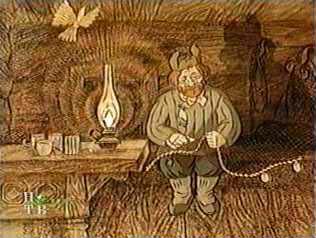- Laughter and Grief by the White Sea
Infobox Film
name = Laughter and Grief by the White Sea

caption =
imdb_rating =
director =Leonid Nosyrev
producer =
writer = Leonid NosyrevYuriy Koval Boris Shergin (story)Stepan Pisakhov (story)Genrikh Sapgir (lyrics)
starring =Tatyana Vasilyeva Klara Rumyanova Yevgeniy Leonov Anatoliy Barantsev Mariya Vinogradova Kira Smirnova Yuriy Volyntsev Boris Novikov Zinaida Popova (vocals)
music =Yevgeniy Botyarov
cinematography =
editing =Olga Vasilenko
distributor =
released = 1987 (USSR )
runtime = 59 min
country =USSR
language = Russian
budget =
preceded_by =
followed_by =
mpaa_rating =
tv_rating =
imdb_id = 0973837"Laughter and Grief by the White Sea" ( _ru. Смех и го́ре у Бе́ла мо́ря; tr.:"Smekh i gore u Bela morya") is a 1987 Soviet traditionally-animated
feature film directed byLeonid Nosyrev made at theSoyuzmultfilm studio. The film is a celebration of the culture of the RussianPomors who live around theWhite Sea .It is based on stories by folklorists and writers
Boris Shergin andStepan Pisakhov .Plot
In the evening, several Pomor men have brought in their boats for the day and are relaxing in a fishermen's hut by the light of a
kerosene lamp . The eldest of them tells them that "there has been so much untruth told about our region" that he wants to set the record straight and tell the whole truth and nothing but the truth. With that said, he begins his first tale.Eternal Icebergs (Вечны льдины)
A tale of how the villagers of the
Arkhangelsk Oblast (alongside with thepolar bear s who work for them) sell "eternal icebergs" which they use in place of boats.About the Bear (Про медведя)
Because this is, after all, the North, no
brown bear s are allowed in the villages - only white polar bears. This is a tale about a brown bear who finds somebaking powder , makes himself white, and attempts to sneak into a village.Frozen Songs (Морожены песни)
A tale by
Stepan Pisakhov .In the winter, it sometimes gets so cold that words freeze as soon as they come out of your mouth. This tale is about how a German merchant buys frozen songs from the people and shows them to a packed concert hall in Germany.The Magic Ring (Волшебное кольцо)
The old man decides to tell a tale about the cat and the dog that the Pomors keep for company in the hut. The tale itself was written by
Boris Shergin .The Sawess (Перепилиха)
A tale about a woman who meets a bear while in the woods and discovers that she has an extremely powerful voice - so powerful that it makes the bear faint and cuts through everything (hence the name "Perepilikha", which comes from "perepilit", "to saw through"). She takes the bear home as a trophy and yells at her husband so much that she bores a hole through his chest. The husband finds that the hole makes music when he breathes and that he can now sing with accompaniment. In the end, the Perepilikha's voice is put to a good use - cutting trees for the men.
The Orange (Апельсин)
A tale about how the narrator once accidentally threw an orange overboard while crossing the river. The orange proceeds to grow into a huge tree (growing in the middle of the river) with one gigantic orange-shaped fruit at its top. They can't cut off the fruit, so they decide to bring in the Sawess. The fruit turns out to be full of hundreds of oranges which rain down on the deck of the ship. In the
polar winter , they find that the orange has absorbed the sun's light from the summer and gives them light during the whole season.Ivan and Andrian (Иван и Андриан)
With the evening getting later, the old man tells a more serious tale. The tale is about two fishermen who decide to spend the night on a small rocky island in the sea. At night a huge storm comes upon them and sinks their boat. Left on the island with no hope of escape or rescue, and knowing that they are going to die, they come to the conclusion the nobody is going to have anything to remember them by and so decide to carve their story on the piece of wood which they used for cutting fish. Meanwhile, their mother sings a song lamenting their deaths. The youngest dies 6 weeks later - the date of death of the oldest is not recorded on the beautifully-carved board.
With his last tale finished, the old man asks his audience if they are asleep. "We're alive", one of them answers.
Creators
Notes
The first six stories, without the connecting sequences, were previously released in three separate films (in 1977, 1979 and 1986). The last story, "Ivan and Andrian", was also released as a separate short film in 1987 under the name "Pomorskaya Byl" (Поморская быль, roughly translated as "A True Story of the Pomors"). "Eternal Icebergs" and "Frozen Songs" were also released separately. About 8 minutes of connecting sequences were made specifically for the feature film.
The film is shown on television at times but is not currently available on DVD, although some of the sections from it are.
ee also
*
Adult animation
*History of Russian animation
*List of animated feature-length films External links
* [http://www.animator.ru/db/?ver=eng&p=show_film&fid=3337 The film] at the
Animator.ru (English and Russian)
*imdb title|id=0973837
* [http://www.myltik.ru/index.php?topic=db&fe=multview&multid=746 The film at myltik.ru] ru icon
* [http://topos.ru/article/3776 Interview with Leonid Nosyrev (2005)] ru icon
Wikimedia Foundation. 2010.
